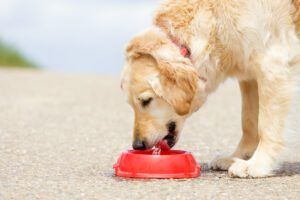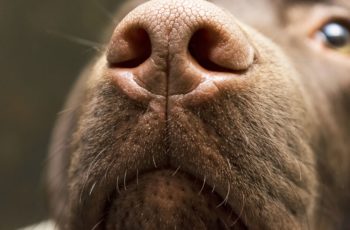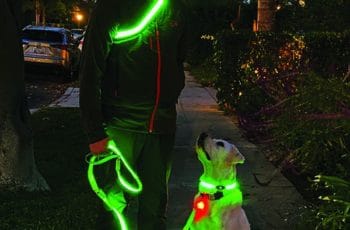
How long can dogs go without water? A dog will start to show signs of dehydration after 24 hours without water. A dry mouth, dry nose, and excessive panting with thick saliva instead of liquid drool are the signs of dehydration in dogs. These are mild signs of dehydration in dogs, but a huge warning that your dog has gone too long without water and needs immediate access to clean, fresh water.
The maximum time a dog can go without water is 48 to 72 hours, although that’s for a healthy adult dog. Dogs with special needs, like puppies, seniors, and sick dogs, cannot go that long.
More serious signs of dehydration in a dog appear quickly. His eyes look sunken. His skin will “tent up” if you pinch a bit (gently) by his shoulders. Normally, that skin should snap back into place. These are warnings that internal problems are starting to reflect the poor hydration—the fact that your dog has gone too long without water. A dog who has gone too long without water may need veterinary attention. The effects of dehydration can harm your dog.
Dangerous Dehydration Signs in Dogs
Many dogs who have gone too long without water will dry vomit and/or have diarrhea, which increases dehydration in dogs. Poor circulation means the heart must work harder and the brain may not get its full requirement of oxygen and nutrients. Severely dehydrated dogs who have gone too long without water can go into shock and die.
If you suspect your dog is dehydrated, get to the veterinarian. You can offer water and/or an electrolyte solution such as Pedialyte on your way. One study found that dogs were more likely to increase fluid consumption if provided a flavored electrolyte solution, like Pedialyte. Keep your dog cool in the car with the AC on or a fan blowing on him.
Prevent Dehydration in Dogs
Obviously, your best bet is to prevent dehydration. Make sure your dog has access to fresh, clean water. If you will be away for hours, consider freezing a bowl of water so it will slowly melt. That way, spillage is reduced, and there is renewable, cold, clean water for your dog to drink.
Your dog should have fresh water available all the time (learn how much water your dog needs to drink). Water is essential for many bodily functions, including making urine to remove toxic metabolic wastes. Water helps your dog to thermoregulate when he is hot by panting. Blood flow, nerve and muscle function, and electrolyte balance are all affected by hydration. No dog should ever go without water long enough to enter a state of dehydration.


